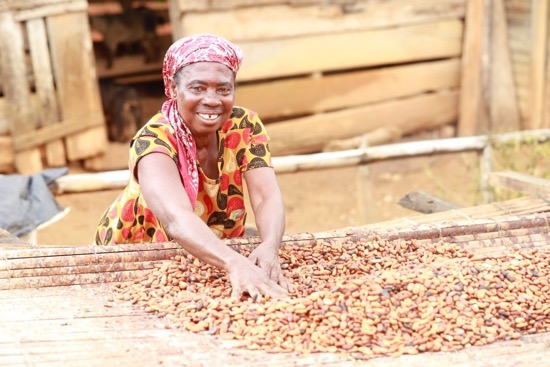Mighty Earth, an international environment watch group, has launched the Cocoa Accountability Map for Ghana, an online tool to track cocoa-driven deforestation.
The interactive map tool, which is accessible to the public at no fee, comes as the organisation reveals forest loss in the country remains stubbornly high, despite pledges by the Ghanaian government and the chocolate industry to reduce cocoa-driven carbon emissions and forest loss.
According to Mighty Earth, the latest figures show 10,550 hectares of deforestation this year within cocoa-growing regions, with 8,188 hectares of this clearance occurring within forest reserves.
“It is likely that much of this clearance has been for cocoa plot expansion,” the organisation claimed, despite admitting it had yet to conduct ground truthing to ascertain the real causes.
The Cocoa Accountability Map for Ghana by Mighty Earth currently works with RADD (Radar for Detecting Deforestation) forest-alert data from 2019 onwards to identify areas of recent land clearance across Ghana, which has lost more than 2.5 million hectares (Mha) (33.7%) of its forest since the early 1990s.
The open-source map for the Ghanaian cocoa industry consolidates data layers to provide greater transparency around deforestation linked to cocoa industry supply chains.
The initiative provides visibility to cocoa cooperatives, with data released by Whittaker, Barry Callebaut, Olam, Blommer, Ecom, Ferrero, Hershey, Mars, Nestle, and Tony’s Chocolonely.
Speaking at the launch in Accra, Mighty Earth’s Senior Advisor for Ghana, Sam Mawutor, observed that “The cocoa beans’ journey from farm to the first point of purchase is still the hardest to track and this is where beans from deforested areas can be mixed with those grown on legally cultivated land.”
“The grim reality is that 30 – 40% of cocoa is still untraceable. Some chocolate companies are sitting on that information,” he regretted.
Mawutor indicated that “Our map can be used to raise deforestation alerts and to hold big business accountable for bad practices. Locally we’re promoting the use of agroforestry approaches, which give value to standing trees and help diversify farmer livelihoods.”
Mighty Earth is training local cocoa farmer cooperatives and Ghana CSO Cocoa Platform members to use the map collaboratively to gain further insight into traceability at the local level, beyond the Licensed Buying Companies (LBC) locations published by corporations.
The Senior Director for Africa at Mighty Earth, Dr Julian Oram, said “It is possible to prevent cocoa from deforested areas ending up in chocolate products, but two things need to happen.
Firstly, small scale farmers, which are the bedrock of the industry, need to be properly remunerated, creating a disincentive to farm in forest reserves, or protected areas.
Secondly, we need effective monitoring, which is where our Ghana Cocoa Accountability Map comes in. Our aim is for farmers, cocoa companies, NGOs, and governmental organizations to work together to end deforestation in supply chains and meet commitments for full traceability from farm gate to chocolate product.”
The new interactive map highlights deforestation hotspots, including those within protected areas and forest reserves, and shows their proximity to LBCs supplying major cocoa traders and chocolate companies.
A cocoa farmer from Adjoobo Okrase in Ghana’s Eastern Region, Evelyn Aziamati, noted that “Protecting our livelihoods means addressing deforestation and being aware of what is happening in our local area.
Tracking where the threats are can help us to raise the alarm before one hectare of deforestation becomes ten.
Keeping our farms going and being able to provide for our families, means growing cocoa sustainably and using standing forests to support our work.”
- Illegal Mining Threatening Ghana’s $230M Cocoa Rehabilitation - April 10, 2024
- Ghana Raises Cocoa Farmgate Price by 58.26% to GHC2,070 per bag - April 5, 2024
- New Standard for Measuring Cocoa Household Income Launched - April 5, 2024
